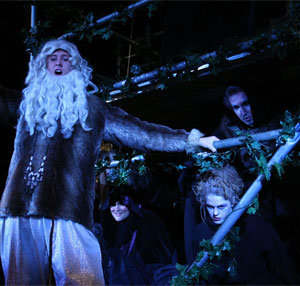 |
| The Fairy of the Lake is performed by fourth-year acting students. Tyler Miedema is the Giant of Frost and with him are the Specters of Hela: Jessica Jerome, Myrthin Stagg and Matthew Peach. (Nick Pearce Photo) |
If you’re a Harry Potter or Lord of the Rings fan, you might want to check out the long-suppressed fantasy The Fairy of the Lake.
DalTheatre Productions and Zuppa Theatre Company bring theatregoers the world premiere of John Thelwall’s Arthurian fantasy The Fairy of the Lake this week. The play opens tonight, Wednesday, Oct. 14 and runs through Saturday, Oct. 17 at the David MacK Murray Theatre in the Dal Arts Centre.
“It’s similar to three Shakespeare plays: Macbeth, A Midsummer Night’s Dream and Henry V. If you combined those three you’d get The Fairy of the Lake,” says director Ben Stone, a co-director of the play along with his Zuppa collaborators Alex McLean and Susan Leblanc-Crawford.
Twenty of Dalhousie’s fourth-year theatre students will be the first ever to perform the 1801 play. Why is that?
|
In recognition of the revival, there will be a conference at the Lord Nelson Hotel called “The Art and the Act” which will celebrate the playwright’s work, with The Fairy of the Lake as the centrepiece.
“It’s a really good play for it never having been performed before,” says Mr. Stone. “The actors are excellent.”
He describes the play as a fantastical whirlwind of evil, love, tyranny and resistance. The Arthurian romance features the intriguing character Rowenna (Allison Basha), an evil sorceress and prime antagonist to Arthur’s rule.
“She’s very malicious and conniving,” says Sebastien Labelle, a fourth-year acting student who plays Arthur.
Arthur is seduced by Rowenna but is aided by the mythical fairy to help achieve freedom of the British people from the Saxon occupiers and eventually becomes king.
Mr. Stone compares the Fairy and Arthur’s relationship to “sort of like how Obi-Wan Kenobi speaks to Luke Skywalker.”
Dalhousie English professor Judith Thompson describes The Fairy of the Lake as an operatic melodrama with demons and fairies and even a trip down to hell.
“It should be spectacular,” says Dr. Thompson, who teaches the graduate seminar Digital Romanticism and Print Culture: The Case of John Thelwall. “It will be interesting to see how they do a burning fire with demons and fairies flying around.”
Mr. Labelle says students have been rehearsing six days a week since the start of term. He admits the experience of working for three directors has been intense, but very efficient: “It has allowed us to really do a lot of work on this play, which I think given the nature of the play would be really hard to pull it off with a single director.”
|
Comments
comments powered by Disqus
